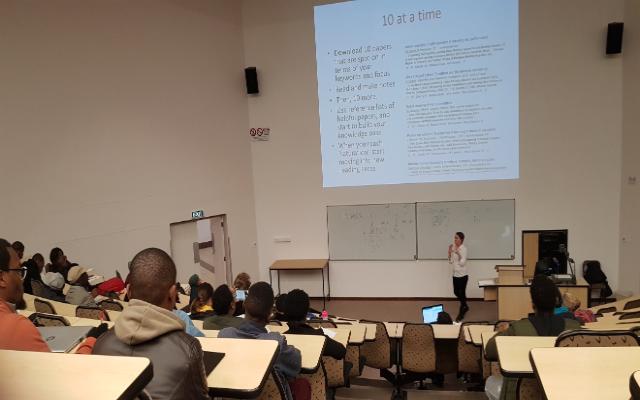
By Manda J Kambikambi, Department of Ichthyology and Fisheries Science student
Reading academic literature is a big part of postgraduate research, and the ability to review and report on pertinent literature is an important academic skill. But many postgraduate students struggle to make sense of the functions of the literature as it pertains to their research.
On the 28th of May 2019, at a workshop organized by the Centre for Postgraduate Studies, Dr Sherran Clarence helped to ease some confusion that comes with engaging with academic literature. Postgraduate students learnt how to structure their reading to make the most of their time, how to write a literature review, and what it means to use their ‘voice’ in writing.
Dr Clarence started by debunking a few myths about academic reading. There isn’t a reading and writing period for your postgraduate study. There will be certain periods when more time will be spent reading, for example at the beginning of your study, but reading should carry on throughout your study. You need not understand every word of every paper to find that reading useful and you don’t have to read all the papers ever written on your topic. You will quite likely be able to take an authoritative position about your work without reading every single paper ever written in the field. Conversely, you cannot read just a few papers on each part of your topic and assume that you know enough. If you can’t confidently explain what the current thinking is in the field, what the key concepts mean, and how the central debates are playing out, then you probably need to read more.
So where do you begin with engaging with the literature? A good place to start is by looking for keywords from your research problem and asking your supervisor for recommendations. Remember to keep a reference list of all the literature you are collecting. For a lot of postgraduate students, this inevitably leads to files full of reading material. Dr Clarence suggests the ‘10 at a time’ rule. Download 10 papers relevant to your research, read and make notes about them, and then download and read 10 more.
To find out more about keeping a reading journal, watch this video.
After a great deal of reading, you might then ask yourself “How will I know when I have read enough on a particular topic?” There are no cast-iron rules to this question as different disciplines will have their own practices. According to Dr Clarence, you have read enough when you have an authoritative stance to take and can point to key texts and thinkers and address them in relation to your study's focus.
You should thereby find your ‘voice’ in your study. The idea of ‘voice’ plays out differently in different disciplines but comes down to your ability to craft an argument about the claims to knowledge your study is making, and its contribution to your field. She explained that the point of the literature review not to just re-state what everyone else has done in the field, but to position your study in relation to the field. Therefore, you do not survey the literature but rather you use it to build part of your overall argument.
Now how do you write all this up? A good guidance shown to the participants was the Claim>Evidence>Explanation method. One starts with a claim in their own words. The claim is then unpacked with evidence from the literature which is then woven into an explanation that shows readers how the claim and evidence linked to the argument that was made.
A few videos that can help with the process of developing an argument and finding your voice can be found here, here and here.
The PowerPoint that Dr Clarence used for the presentation can be downloaded here.
Overall, Dr Clarence had the following advice for postgraduate students wanting to become more familiar with a literature review:
- Find and learn how to use bibliographical software e.g. Paperpile, Refwords, Mendeley, or Endnote to keep track of your literature.
- Keep a reading journal. Write about what you have learnt from a paper after reading it. The purpose of a reading journal is to help you find your argument or voice in relation to what others have done.
- Keep a research journal, do some freewriting and create mind maps. These tools help get ideas out of your head and onto paper.
- Find people you can talk aloud to about your research. Maybe join a writing group and meet with other postgraduate scholars on campus. You can sign up for one here.
- The only way through the reading is through it. Make time and protect that time!
